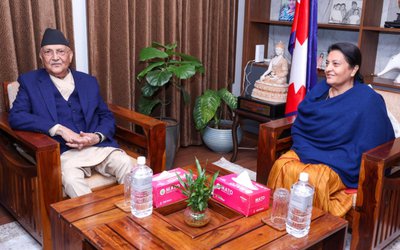
Though separated by a generation Nepal's B.P. Koirala and Myanmar's Aung San Suu Kyi have many things in common. Suu Kyi is the South East Asian nation's best known democratic figure with international repute. The Nobel laureate is the icon of democracy of the military-ruled country. She has been a lifelong champion of peaceful struggle for the restoration of the fundamental rights and freedom of the people. The late B.P.Koirala also remains the best known international personality of Nepal. He was also a lifelong champion of the democratic rights and values and individual freedom. Both spent years in prison refusing to make any compromises on the values they had faith in.
Most important, both believed in political reconciliation as a means to resolve the political crisis in their respective countries. It was only natural therefore that the Myanmar opposition leader during her recent high-profile visit to Nepal spoke highly of the relevance of a negotiated compromise something the late B.P. had championed, on his return from exile in India, in the 1970s.
Addressing an international conference on ‘Relevance of Democratic Socialism’, Suu Kyi praised the Nepali political leaders for demonstrating what she said was an exemplary negotiated compromise. Her reference was apparently to the political developments that took over the past decade. “From Nepal, we have learnt an important message of democratic politics: the idea of negotiated compromise”, she said. "Nepal and Burma may seem like they are on the same leg of political development, Nepal was far ahead."
She was all praise of the agreement in Nepal and hoped that military leaders in her country learnt to make agreements based on such negotiation.
Although Suu Kyi lauded Nepal’s system of negotiating compromise and many compared it to B.P’s policy, critics question whether the practice of making agreements today is actually a genuine compromise.
One of the integral aspects of B.P’s National Reconciliation Policy was forging a national consensus by including both the democratic forces and the King. An ideal agreement based on negotiation, as Syuu Kyi said, should be an all embracing one. But Nepal’s recent agreements have lacked a broad national consensus, forged as they were among the few big parties. A number of moves of far reaching consequences had been taken without embracing all. The abolition of monarchy, the declaration of republic and converting Nepal from a Hindu nation to a secular one may have the popular legitimacy coming as it did close on the heels of an anti-king democracy movement. But they lacked the due process expected in an all-embracing democracy.
The visiting dignitary may not have been fully aware of the present ground realities of Nepal, otherwise she would have noticed to her surprise that "the negotiated compromise for an all-embracing agreement" was not producing the desired results.
Nepal’s inability to promulgate a new constitution despite repeated attempts also shows that the model of negotiated compromise has so far been a farce. Bitter infighting and rivalry amongst political parties have stalled the constitution making process for a very long time now. Although the democratic icon expressed hope the model would help in promulgating a new constitution, it does not look likely. With conflict and contradiction amongst the parties that led the democracy struggle in Nepal showing no signs of ending, a true reconciliation or the negotiated compromise has eluded Nepal.
- Ukrainian Crisis And The World (Dis)Order
- Apr 22, 2022
- China’s Cautious Steps In The Graveyard Of Empires
- Aug 18, 2021
- Foreign Aid On The Fence!
- Aug 08, 2021
- Communist Party of China centenary celebrations Reading between the lips
- Jul 14, 2021
- Second Wave Of Covid-19 In India: Deadly Blow To The Economy
- Jun 23, 2021
















